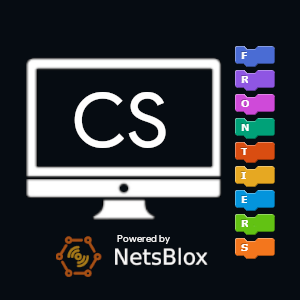Body
Image

Computer Science Frontiers
The Computer Science Frontiers (CSF) curriculum created during this project aims to expand access, especially for high school girls, to the most exciting and emerging frontiers of computing, such as machine learning, as well as other 21st century skills required to productively leverage computational methods and tools. The project-based curriculum consists of four 9-week modules: Distributed Computing, Artificial Intelligence/Machine Learning, Cybersecurity/Internet of Things, and Software Engineering. CSF leverages NetsBlox, a powerful yet easy-to-use visual programming environment that has been shown to increase engagement and interest in computing. Additionally, NetsBlox supports effective collaboration while facilitating learning of advanced computing concepts. The curriculum was co-designed with practicing high school teachers and was tested in multiple summer camps. A full year course is currently being piloted in a Nashville public high school for the second year in a row. Our evaluation of student attitudes participating in our programs supports previous research that female students engage well with socially relevant topics like contextually situated AI and Machine Learning. Specifically, our results show a positive increase in female participant confidence and self efficacy in computer science content and career identity.
Pillar 1: Innovative Use of Technologies in Learning and Teaching
CSF uses NetsBlox, a block-based programming environment that opens the internet for student programs. It lets them access a rich library of online data sources and services, such as Google Maps, a movie database, science data, etc. They can create social applications like a chatroom or distributed multiplayer games. Student projects can access their phone's sensors turning the phone into an IoT device. Students program virtual robots in a 3D simulated environment collaborating with or competing against each other.
Pillar 2: Partnerships for Career and Workforce Preparation.
CSF has been approved by the TN DoE, so any high school in the state may adopt it. We have worked with 8 teachers from three states who taught various modules or the entire course in camps and in their classrooms. We partnered with the Tennessee STEM Innovation Network tasked by the state to support all public schools with meeting the new high school CS graduation mandate. We partnered with Coursera and published a free 6-week online course aimed as professional development for teachers to prepare them for teaching CSF.
Pillar 3: Strategies for Equity in STEM Education
CSF uses equity-focused pedagogies such as PBL, datasets with personal relevance to students and communities (e.g., climate change, healthcare, and social justice data), opportunities for personalization (through project choices), and engagement with the social implications of computing. The curricular modules have been co-designed with a group of diverse high school teachers and it allows for customization to increase relevance to students’ lives, communities, and interests.

Discipline(s)
Computer and informational technology science
Data Science
Target Gradespan(s)
High school (9-12)
Target Participant(s)
Youth / students
Project Setting(s)
Formal Education
Category
Developing and Testing Innovations (DTI)